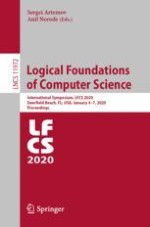2020 | OriginalPaper | Buchkapitel
Feedback Hyperjump
verfasst von : Robert S. Lubarsky
Erschienen in: Logical Foundations of Computer Science
Aktivieren Sie unsere intelligente Suche, um passende Fachinhalte oder Patente zu finden.
Wählen Sie Textabschnitte aus um mit Künstlicher Intelligenz passenden Patente zu finden. powered by
Markieren Sie Textabschnitte, um KI-gestützt weitere passende Inhalte zu finden. powered by
